Text this colour links to Pages. Text this colour links to Family Trees. Place the mouse over images to see a larger image. Click on paintings to see the painter's Biography Page. Mouse over links for a preview. Move the mouse off the painting or link to close the popup.
15 Jun is in June.
1312 Capture, Trial and Execution of Piers Gaveston
1429 Battle of Meung sur Loire
1517 Sweating Sickness Outbreak
Events on the 15th June
On 15th June 923 Robert I King West Francia (age 57) died. On 13th July 923 his son-in-law Rudolph aka Raoul I King West Francia (age 33) was elected I King West Francia.
On 15th June 1215 King John of England (age 48) met with his Baron's at Runnymede [Map] where he agreed to the terms of the Magna Carta which attempted to reduce the King's authority through political reform. Those who signed as surety included:
Roger Bigod 2nd Earl Norfolk (age 71)
his son Hugh Bigod 3rd Earl Norfolk (age 33)
Henry Bohun 1st Earl Hereford (age 39)
Richard Clare 3rd Earl Hertford (age 62)
his son Gilbert Clare 5th Earl Gloucester 4th Earl Hertford (age 35)
William "The Younger" Marshal 2nd Earl Pembroke (age 25)
William Mowbray 6th Baron Thirsk (age 42)
Saer Quincy 1st Earl Winchester (age 45)
Robert Ros (age 43), Richard Percy 5th Baron Percy Topcliffe (age 45)
Robert de Vere 3rd Earl of Oxford (age 50)
Eustace Vesci (age 46)
John Fitzrobert 3rd Baron Warkworth (age 25)
John Lacy Earl Lincoln (age 23).
William D'Aubigny (age 64), Geoffrey Mandeville 2nd Earl Essex (age 24)
William Forz 3rd Earl Albemarle
William Hardell
William Huntingfield
William Llanvallei
William Malet 1st Baron Curry Mallet
Roger Montbegon, Richard Montfichet
Geoffrey Saye (age 60) signed as surety the Magna Carta.
Ranulf de Blondeville Gernon 6th Earl Chester 1st Earl Lincoln (age 45) witnessed.
![]() Become a Member via our 'Buy Me a Coffee' page to read complete text.
Become a Member via our 'Buy Me a Coffee' page to read complete text.
Around 15th June 1312 Piers Gaveston 1st Earl Cornwall (age 28) was tried at Warwick Castle [Map] by Guy Beauchamp 10th Earl Warwick (age 40), Humphrey Bohun 4th Earl Hereford 3rd Earl Essex (age 36), Thomas Plantagenet 2nd Earl of Leicester, 2nd Earl Lancaster, Earl of Salisbury and Lincoln (age 34) and Edmund Fitzalan 2nd or 9th Earl of Arundel (age 27). He was condemned to death.
On 15th June 1315 James "The Just" II King Aragon (age 48) and Marie Lusignan Queen Consort Aragon were married. She by marriage Queen Consort Aragon. He the son of Peter III King Aragon and Constance Hohenstaufen Queen Consort Aragon.
Before 15th June 1327 the Weardale Campaign commenced with the Scottish army crossed the border into England after truce negotiations had broken down. One army crossed in the west, one in the east.
Chronicle of Robert Fabyan. 15th June 1330. The XV daye of lune folowynge was borne the kynges firste sone, and at Wodestoke crystenyd, and namyd Edwarde, whiche, in processe of tyme, grewe to a noble & famouse man, and is moost comonly callyd in all cronycles prynce Edwarde, of whome in this story some excellent dedys shall be expressyd.
On 15th June 1330 Edward "Black Prince" was born to King Edward III of England (age 17) and Philippa of Hainault Queen Consort England (age 15) at Woodstock Palace, Oxfordshire [Map]. Coefficient of inbreeding 3.00%.
On 15th June 1381 King Richard II of England (age 14) met with Wat Tyler at Smithfield [Map]. During the course of the meeting Wat Tyler was wounded by William Walworth. Wat Tyler was then captured and beheaded at Smithfield [Map]. His head was placed on top a pole and carried through the city, then displayed on London Bridge.
On 15th June 1381 John Cavendish (age 35) was captured at Church of St Mary, Cavendish during the Peasants' Revolt. He was beheaded in the Market Place in Bury St Edmunds.
Patent Rolls. 15th June 1381. Commission of oyer and terminer to William Walleworth, mayor of London, Robert Bealknapp, Robert Knolles, Nicholas Brembre, John Philipot, Robert Launde, and William Cheyne, on information that great crowds of labourers and others have collected together, especially in the counties of Essex, Kent, Surrey, Sussex, and Middlesex, compelled their betters to go with them, killed many of the king's lieges, and burned many houses, entered the city of London, and burned the house of the king's uncle John, duke of Lancaster (age 41), called the 'Sauveye [Map],' and the priory in Clerkenwelle of the Hospital of St. John of Jerusalem in England, and killed Simon, archbishop of Canterbury (deceased) and chancellor, and Robert de Hales (deceased), prior of the said Hospital. By К. June 15. London.
Froissart Book 10: 1380-1382. [222] [15th June 1381] At those words, he spurred his horse, on which he was mounted, and separated himself from his companions, coming directly toward the King—so close that the tail of his horse was over the head of the King's own horse. The first thing he said, he addressed the King and said: “King, do you see all these people over there?” “Yes,” said the King. “Why do you ask?” “I ask because they are all under my command, and they have all sworn loyalty and obedience to do whatever I want.” “Very well,” said the King. “I am content with that.” Then Tyler, who was looking for trouble, said: “And do you think, King, that all those people here—and just as many in London—who are under my command will leave without carrying letters from you? No! We will carry them all with us before us.” The King replied: “It has been arranged, and they will be given, one after another. Friend, go back peacefully to your men and lead them back to London. Be calm and think of yourselves, for it is our will that each of you, by village and town, shall have letters as agreed.” At these words, Wat Tyler turned his eyes toward a royal squire who stood behind the King and bore the King's sword. Tyler hated this squire greatly, for they had once exchanged angry words, and the squire had insulted him. “Ah, so you're here,” said Tyler. “Give me your dagger.” “I will not,” said the squire. “Why should I give it to you?” The King looked at his squire and said: “Give it to him.” The squire gave it reluctantly. Once Tyler had it, he began to play with it and turn it in his hand. Then he said to the squire again: “Give me that sword.” “I will not,” replied the squire. “It is the King's sword. You are not worthy to have it, for you're just a rogue. And if you and I were alone in this place, you wouldn't say such things—not for all the gold as great as the church of Saint Paul.” “By my faith,” said Tyler, “I will not eat again until I have your head.” At this point, the Mayor of London, William Walworth, arrived, mounted on horseback and armed under his coat. He forced his way through the crowd, saw how Tyler was behaving, and said: “Fellow, how dare you speak such words in the presence of the King? That's far too much for you!” The King grew angry and said to the mayor: “Mayor, lay hands on him.” While the King was speaking, Tyler turned to the mayor and said: “And what I say and do—what's it to you?” “Indeed!” said the mayor, who was devoted to the King. “Filthy scoundrel, you speak like that in the presence of my natural lord? I swear, you'll pay for it.” Then the mayor drew a large baselard (a kind of long dagger) he was carrying and gave Tyler such a powerful blow to the head that he knocked him to the ground at his horse's feet. As soon as Tyler fell, he was surrounded on all sides so he could not be seen by the assembled crowd—his own followers—who were standing nearby. Then a royal squire named John Standwich dismounted, drew his fine sword, and stabbed Tyler in the stomach—there he died. When the rebel crowd realized their captain had been killed, they began to murmur and cry out: “They've killed our captain! Let's go! Let's kill them all!” With that, they formed into battle ranks on the field, each man who had one placing his bow before him. At that moment, the King performed a great and bold act, which turned out for the best. For as soon as Tyler was brought down, the King rode away from his companions alone, saying: “Stay here. Let no one follow me.” He rode straight toward the angry crowd, who were forming to avenge their captain, and said: “Good people, what is it you want? You have no other captain but me. I am your King. Remain in peace.” And so it happened that most of the crowd, when they saw the King and heard him speak, were overcome and began to flee—for they were the peaceful ones. But the more violent ones did not retreat; rather, they held their ground and made it seem as though they would attack. Then the King returned to his men and asked what should be done next. He was advised to move toward the open fields, because flight or delay would do them no good. And the mayor said: “It is best we do this, for I believe we will soon receive great support from the good people of London, who are prepared and armed with their friends, waiting in their homes.”
[222] A ces mos, il esperonne un cheval sur quoi il estoit montés, et se part de ses compaignons, et s'en vient droitement au roi et si priès de li que la queue de son cheval estoit sus la teste dou cheval dou roi. Et la première parolle qu'il dist, il parla au roi et dist enssi: "Rois, vois tu toutes ces gens qui sont là?" —"Oïl, dist li rois, pourquoi le dis tu?"—"Je le di pour ce que il sont tout à men commandement, et m'ont tout juré foi et loiauté à faire che que je vaurai." —"A le bonne heure, dist li rois, je voel bien qu'il soit enssi." Adont dist Tieulliers, qui ne demandoit que le rihotte: "Et quides tu, di, rois, que cils peuples qui là est, et otant à Londres, et tous en men commandement, se doie partir de toi enssi sans porter ent vos lettres? Nenil; nous les emporterons toutes devant nous." Dist li rois: "Il en est ordonné, et il le faut faire et delivrer l'un apriès l'autre. Compains, retraiiés vous tout bellement deviers vos gens et les faites retraire à Londres, et soiés paisieule, et pensés de vous, car c'est nostre entente que cascuns de vous par villages et maries ara se lettre, enssi comme dit est." A ces mos, Wautre Tieullier jette ses ieus sus un escuier dou roi qui estoit derière le roi et portoit l'espée dou roi, et haoit cils Tieulliers grandement cel escuier, car autrefois il s'estoient pris de parolles, et l'avoit li escuiers vilonné: "Voires, dist Tieulliers, es tu là? Baille moi ta daghe."—"Non ferai, dist li escuiers, pour quoi le te bailleroie je?" Li rois regarde sus son vallet, et li dist: "Bailles li." Chils li bailla moult envis. Quant Tieulliers le tint, il en commencha à juer et à tourner en sa main, et reprist la parolle à l'escuier et li dist: "Baille moi celle espée." —"Non ferai, dist li escuiers, c'est li espée dou roi; tu ne vaulx mies que tu l'aies, car tu n'ies que uns garchons, et, se moi et toi estièmes tout seul en celle place, tu ne diroies ces parolles ne eusses dit, pour ossi grant d'or que cils moustiers de Saint Pol est grans." —"Par ma foi, dist Tieulliers, je ne mengerai jamais si arai ta teste." A ces cops estoit venus li maires de Londres, li dousimes montés as chevauls et tous armés desous leurs cottes, et rompi la presse, et veï comment cils Tieulliers se demenoit; si dist en son langage: "Gars, comment es tu si ossés de dire tels parolles en la presence dou roi? C'est trop pour toi." Adont li rois se felenia et dist au maieur: "Maires, mettés le main à li." Entrues que li rois parloit, cils Tieulliers avoit parlé au maieur et dit: "Et, de ce que je di et fach, à toi qu'en monte?"—"Voire, dist li maires, qui ja estoit avoés dou roi, gars puans, parles tu enssi en la presence de mon naturel signeur? Je ne voel jamais vivre, se tu ne le comperes." A ces mos il traïst un grant baselaire que il portoit, et lasque et fiert che Tieullier un tel horion parmi la teste que il l'abat as piés de son cheval. Sitos comme il fu cheus entre piés, on l'environna de toutes pars, par quoi il ne fust veus des assamblés qui là estoient et qui se dissoient ses gens. Adont descendi uns escuiers dou roi, que on appelloit Jehan Standuich, et traïst une belle espée que il portoit et le bouta, ce Tieullier, ou ventre, et là fu mors. Adont se perchurent ces folles gens là asamblés que leur cappitains estoit ochis. Si commenchièrent à murmurer ensamble et à dire: "Il ont mort nostre cappitaine! alons! alons! ochions tout!" A ces mos, il se rengièrent sus le place par manière de une bataille, cascun son arc devant li, qui l'avoit. Là fist li rois un grant outrage, mais il fu convertis en bien, car, tantos comme Tieulliers fu aterés, il se parti de ses gens tous seuls, et dist: "Demorés chi. Nuls ne me sieue." Lors vint il au devant de ces folles gens, qui s'ordonnoient pour vengier leur cappitainne, et leur dist: "Signeur, que vous fault? Vous n'avés autre cappitainne que moi: je sui vostres rois; tenés vous en pais." Dont il avint que li plus de ces gens, sitos comme il veïrent le roi et oïrent parler, il furent tout vaincu et se commenchièrent à defuir, et che estoient li paisiule; mais li mauvais ne se departoient mies, anchois se ordonnoient et monstroient que il feroient quelque cose. Adont retourna li rois à ses gens et demanda que il estoit bon à faire. Il fu consilliet que il se trairoient sus les camps, car fuirs ne eslongiers ne leur valloit riens, et dist li maires: "Il est bon que nous fachons enssi, car je suppose que nous arons tantos grant confort de ceuls de Londres des bonnes gens de nostre lés, qui sont pourveus et armés, eux et leurs amis, en leurs maissons."
![]() Become a Member via our 'Buy Me a Coffee' page to read complete text.
Become a Member via our 'Buy Me a Coffee' page to read complete text.
All About History Books
The Deeds of King Henry V, or in Latin Henrici Quinti, Angliæ Regis, Gesta, is a first-hand account of the Agincourt Campaign, and subsequent events to his death in 1422. The author of the first part was a Chaplain in King Henry's retinue who was present from King Henry's departure at Southampton in 1415, at the siege of Harfleur, the battle of Agincourt, and the celebrations on King Henry's return to London. The second part, by another writer, relates the events that took place including the negotiations at Troye, Henry's marriage and his death in 1422.
Available at Amazon as eBook or Paperback.
Thomas Walsingham Chronicon Angliæ 1381. [15th June 1381] Upon hearing this, the King, although he was but a boy and of tender age, was seized with boldness and ordered the Mayor of London to arrest him. The Mayor, a man of incomparable courage and boldness, immediately and without hesitation arrested him, striking his head with a blow that greatly disoriented him. Soon after, he was surrounded by other royal officers and pierced with swords in various parts of his body. Falling from his horse to the ground, he became the first to show that resistance to the commons was possible, restoring hope to the nearly defeated English nobility. Immediately, when the commons saw his fall, they cried out in grief over his death, saying: "Our captain is dead! Our leader has been treacherously killed! Let us stand together! Let us die with him! Let us shoot our arrows and manfully avenge his death!" So they readied their bows to shoot. But the King, displaying a mind and courage beyond his years, spurred his horse and rode toward them, circling their ranks, and said: "What is this, my people? What are you doing? Would you shoot at your King? Do not stir trouble, nor grieve over the death of a traitor and a knave. I will be your King. I will be your captain and leader. Follow me into the field, and you shall have whatever you wish to ask for."
Quibus aunditis, Rex, quanquam puer esset et tenerioris ætatis, concepta audacia, jussit Majori Londoniarum ut eum arestaret. Major autem, vir incomparabilis animositatis et andaciæ, indubitanter eum illico arestavit, librato ictu ejus capiti, qui eum plurimum perturbavit. At mox ab aliis ministris regiis circumclusus, gladiis diversis in locis corporis transverberatur ; corruensque de equo in terram, primum dedit spem Anglicaniæ militiæ, fere mortuæ, communibus posse resisti. Statimque, ut communes viderunt ejus ruinam, præ dolore mortis clamaverunt;—"Mortuus est capitaneus noster, proditiose peremptus est ductor noster. Stemus simul, moriamur cum ipso, sagittemus et vindicemus viriliter mortem ejus." Tensis ergo arcubus, sagittare pararunt. Rex vero ultra ætatem mirabiliter ingenio præventus, et andacia concitus, calcaribus urgens equum ad eos accesgit, et in circnitu eorum equitans, dixit eis;—"Quid est hoc, homines mei? Quid agitis? Nunquid sagittare vultis Regem vestrum? Non causemini, nec sitis tristes de morte proditoris et ribaldi. Ego enim ero Rex vester, ego capitaneus et ductor vester; sequimini me in campum, habituri omnia quecunque vos petere delectabit."
![]() Become a Member via our 'Buy Me a Coffee' page to read complete text.
Become a Member via our 'Buy Me a Coffee' page to read complete text.
Chronicle of Adam of Usk. 15th June 1381. In this rising of the commons were many great men of the land in many places beheaded. The Savoy [Map], the palace of the duke of Lancaster (age 41) and the fairest in the kingdom, standing near London on the bank of Thames, was, from the commons' hatred of the duke, utterly destroyed by them with fire; and the duke himself, for fear of them, fled into Scotland1. To appease them and to quiet their fury, the king (age 14) granted that the state of villeinage, as well in their persons as in their labour, should be henceforth done away, freedom fully given, and all prisoners set at large. And this he commanded and made to be openly proclaimed throughout the counties of the kingdom. And then what a throe of grief passed through the desolated land! For they boasted that they would slay all those of higher birth, would raise up king and lords from among themselves, would stablish new laws, and, in a word, would make new, or rather - disfigure, the face and estate of the whole island. Then every man struck off the head of his enemy, and despoiled his richer neighbour. But, by the mercy of God, when their leader, being in Smithfield near London, doffed not his hood before the king nor in anything did reverence to the king's majesty, his head was deftly struck off, in the very midst of his flock of kites, by sir William Walworth, knight and citizen of London; and straightway, being raised on the point of a sword, it was shown before them. Then the commons in sore dread sought flight by stealth, and there and then casting away their rebellious weapons, as though unguilty of such riot and wickedness, like foxes into their holes, they pitifully crept home. But the king and the lords pursued them, and some they made to be dragged behind horses, some they slew with the sword, some they hanged on the gallows, some they quartered; and they destroyed thousands2.
Note 1. John of Gaunt was at this time in the north, negotiating a truce with Scotland. Knighton (ij. 143-7) tells us that so unpopular was his name that his duchess was refused admission into his own castle at Pontefract [Map], and that he himself was denied hospitality by the earl of Northumberland; and that it was reported that a large force of the insurgents was sent north in pursuit of him. He retired to Edinburgh on a safe-conduct from the Scots, by whom he was well entertained.
Note 2. The severity of the punishments inflicted after the suppression of the outbreak is fully set forth in the pages of Walsingham's History. Richard, however, interfered to prevent indiscriminate slaughter of the insurgents when first beaten in the field.— Wals. Hist. Angl. (Rolls series), i. 466.
![]() Become a Member via our 'Buy Me a Coffee' page to read complete text.
Become a Member via our 'Buy Me a Coffee' page to read complete text.
Patent Rolls. 15th June 1405. Ripon, North Yorkshire [Map]. Commission to John Skelton, Robert Louthyr, Roland Vaus, William de Louthyr and John de la More to receive the castle of Cokyrmouth [Map] into the king's hands from its keepers or governors and to deliver it; to the king's brother [in-law] Ralph, earl of Westmorland (age 41), or his deputies or his deptuies or attorneys to keep in the king's name. By K.
Chronicle of Gregory. 15th June 1415. Al so the same year the kyng (age 28) toke his jornay and wagyd10 in to Normandy; and the xv day of Juny the kyng roode thorowe London11 whithe sherevys, aldermen, and alle the comeners brought the King at Blacke Hethe [Map]; and there the mayre ande alle his aldermen with alle the comyns toke there leve of [th]e King, and the kyng bade the mayre goo home and kepe welle his chambyr in his absens, and [yave hym]12 Crystysse blessyng and hys, and he said "Cryste save London."
Note 10. So in MS., but apparently a transcriber's error for "viagyd."
Note 11. So in MS.; but doubtless we should supply here, as the beginning of a new sentence, "And the mayor."
Note 12. Omitted in our MS., but supplied from Vit. A. xvi.
On 15th June 1429 Joan of Arc (age 17) and Jean Poton Xaintrailles (age 39) fought at Meung-sur-Loire, Loiret during the Battle of Meung sur Loire capturing the bridge over the Loire.
Between 1451 and 15th June 1452 Robert Boyd 1st Lord Boyd (age 31) was created 1st Lord Boyd by King James II of Scotland (age 20). On 15th June 1452 King James II of Scotland confirmed the charter of Robert Boyd, Lord of Kilmarnock and of Dalry, conveying one-third of the lands of Lynn in Dalry to Robert Boyd [indweller] of Lynn. He took his seat in Parliament on 18th July 1454.
On 15th June 1496 Joan Albret was born to Jean III King Navarre (age 27) and Catherine Grailly I Queen Navarre (age 28).
The Life and Times of Cardinal Wolsey Volume 2. Around 15th June 1517. But his Majesty was soon interrupted in his intention, for, before June was expired, there broke out among the people a distemper, called the Sweating Sickness, which made great ravage in the Kingdom especially in London. It was otherwise termed the Sudor Anglicanus, or the English Sweat; "which carried off, says Lord Herbert, divers Knights, Gentlemen, and Officers of the King's Courts, particularly Lord Clinton (deceased)1, Lord Grey of Wilton (age 20), and "others of quality." In some places it took away a third, in others half the people. This plague continued from the latter end of June to December during which time the Judges adjourned the Term, and his Majesty kept no Court, but was only attended by his own Family and his Prime Minister, Wolsey; and Hall says he much lamented the affliction that thus attended his people.
No sooner did this infectious distemper cease, but it was succeeded, as Stow relates, by so great a Drought, that it did not rain from December to May following, and the frost was so hard in the Winter, that Horses and Carts passed over the ice between Westminster and Lambeth.
Note 1. From this Nobleman [Thomas Clinton 8th Baron Clinton] the late Right Honourable Henry, Earl of Lincoln, was descended, who was Paymaster of the Forces in the Reign of George the III. His Lordship married Lucy, sister of his present Grace, Thomas, Duke of Newcastle, by whom he had issue two sons, George and Henry besides Daughters. The Earl died the 7th of Sept. 1728, and his Countess the 20th of July, 1736; and his Lordship was succeeded in his Honour and Estate by George, his eldest son, a young Nobleman just arrived at Age, who gives room for great Expectations. The Title of Lord Clinton is now enjoyed by the Right Hon. Hugh Fortescue, who was called up by Writ to the House of Lords on the 16th of March having first made out his claim to the satisfaction of his Majesty and the House of Lords.
On 15th June 1519 Henry Fitzroy 1st Duke Richmond and Somerset was born illegitimately to Henry VIII (age 27) and Elizabeth "Bessie" Blount Baroness Clinton and Tailboys (age 21) at Augustinian Priory of St Lawrence, Ingatestone [Map].
Letters and Papers. 15th June 1536. R. O. 1138. John Husee to Lord Lisle (age 72).
I have received your sundry letters by Tatton and Shepard, and lately of Goodalle. As to the marsh, I delivered your letter to Mr. Secretary, and he made me as good an answer as I could wish, viz., that the inhabitants must bring the marsh to its first state at their own cost, and they shall have it in common, as it was before the draining and enclosure lately made by Sir Rob. Wingfield. He promised that Wingfield's patent should be resumed now by Act of Parliament, and that of this I should have an answer this day; but I think this cannot well be on account of the solemnities at Westminster, where the King and Queen (age 27) have been at mass, and came riding thither and homewards with all the estates and peers before them on horseback. There were almost as many people as at the Coronation. Tonight or in the morning I will call on him for his letters.
This would have been dispatched long since if the instruction had been discreetly given by Water Skynner; "or else the writer penning the same after his purpose did pretend to work some feat of his friendship, giving a cast of his office to Sir R. W. Howbeit, I trust the same is now at some better point than divers would have it." As soon as Mr. Secretary had showed me his mind I made Mr. Boys and Mr. Prisley privy thereto. I write in my other letters touching your Lordship's own affairs. Southwark, Corpus Christi Day, 15 June. Hol., pp. 2. Add.
On 15th June 1541 John Neville of Chevet (age 53) was executed for having failed to report a conspiracy.
On 15th June 1553 William Cecil 1st Baron Burghley (age 32) signed My Device for the Succession.
Edward Rogers (age 55) was present.
St Mary the Virgin Church, Edelsborough [Map]. Brass to Henry Brugis, died 15th June 1647, and his wife Francis Pigoot, now lost.
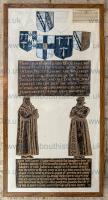
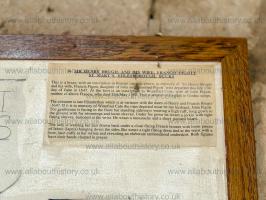
On 15th June 1658 Thomas Milward (age 84) died. Monument at St Cuthbert's Church, Doveridge [Map].
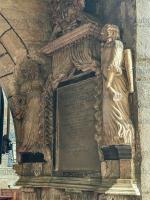
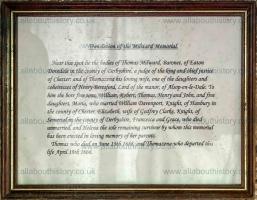
Thomas Milward: Around 1574 he was born. In or before 1609 he and Thomasine Beresford were married.
Samuel Pepys' Diary. 15th June 1663. Both at and after dinner we had great discourses of the nature and power of spirits, and whether they can animate dead bodies; in all which, as of the general appearance of spirits, my Lord Sandwich (age 37) is very scepticall. He says the greatest warrants that ever he had to believe any, is the present appearing of the Devil1 in Wiltshire, much of late talked of, who beats a drum up and down. There are books of it, and, they say, very true; but my Lord observes, that though he do answer to any tune that you will play to him upon another drum, yet one tune he tried to play and could not; which makes him suspect the whole; and I think it is a good argument. Sometimes they talked of handsome women, and Sir J. Minnes (age 64) saying that there was no beauty like what he sees in the country-markets, and specially at Bury, in which I will agree with him that there is a prettiest women I ever saw. My Lord replied thus: "Sir John, what do you think of your neighbour's wife?" looking upon me. "Do you not think that he hath a great beauty to his wife? Upon my word he hath". Which I was not a little proud of.
Note 1. In 1664, there being a generall report all over the Kingdom of Mr. Monpesson his house being haunted, which hee himself affirming to the King (age 33) and Queene (age 53) to be true, the King sent the Lord Falmouth, and the Queene sent mee, to examine the truth of; but wee could neither see nor heare anything that was extraordinary; and about a year after, his Majesty told me that hee had discovered the cheat, and that Mr. Monpesson, upon his Majesty sending for him, confessed it to him. And yet Mr. Monpesson, in a printed letter, had afterwards the confidence to deny that hee had ever made any such confession" ("Letters of the Second Earl of Chesterfield", p. 24, 1829, 8vo.). Joseph Glanville published a relation of the famous disturbance at the house of Mr. Monpesson, at Tedworth, Wilts, occasioned by the beating of an invisible drum every night for a year. This story, which was believed at the time, furnished the plot for Addison's play of "The Drummer", or the "Haunted House". In the "Mercurius Publicus", April 16-23, 1663, there is a curious examination on this subject, by which it appears that one William Drury, of Uscut, Wilts, was the invisible drummer. B.
![]() Become a Member via our 'Buy Me a Coffee' page to read complete text.
Become a Member via our 'Buy Me a Coffee' page to read complete text.
Samuel Pepys' Diary. 15th June 1663. Thence to church, where Dr. Britton preached a sermon full of words against the Nonconformists, but no great matter in it, nor proper for the day at all. His text was, "With one mind and one mouth give glory to God, the Father of our Lord Jesus Christ". That done, by water, I in the barge with the Maister, to the Trinity House, Deptford [Map] at London; where, among others, I found my Lords Sandwich and Craven (age 55), and my cousin Roger Pepys (age 46), and Sir Wm. Wheeler (age 52). Anon we sat down to dinner, which was very great, as they always have. Great variety of talk. Mr. Prin (age 63), among many, had a pretty tale of one that brought in a bill in parliament for the empowering him to dispose his land to such children as he should have that should bear the name of his wife. It was in Queen Elizabeth's time. One replied that there are many species of creatures where the male gives the denomination to both sexes, swan and woodcock, but not above one where the female do, and that is a goose.
Samuel Pepys' Diary. 15th June 1664. Up and by appointment with Captain Witham (the Captain that brought the newes of the disaster at Tangier [Map], where my Lord Tiviott was slain) and Mr. Tooker to Beares Quay, and there saw and more afterward at the several grannarys several parcels of oates, and strange it is to hear how it will heat itself if laid up green and not often turned. We came not to any agreement, but did cheapen several parcels, and thence away, promising to send again to them.
Samuel Pepys' Diary. 15th June 1664. And anon at noon comes Mr. Creed by chance, and by and by the three young ladies: [Lord Sandwich's (age 38) daughters.] and very merry we were with our pasty, very well baked; and a good dish of roasted chickens; pease, lobsters, strawberries.
Samuel Pepys' Diary. 15th June 1664. So to the Victualling Office, and then home. And in our garden I got Captain Witham to tell me the whole story of my Lord Tiviott's misfortune; for he was upon the guard with his horse neare the towne, when at a distance he saw the enemy appear upon a hill, a mile and a half off, and made up to them, and with much ado escaped himself; but what became of my Lord he neither knows nor thinks that any body but the enemy can tell. Our losse was about four hundred. But he tells me that the greater wonder is that my Lord Tiviott met no sooner with such a disaster; for every day he did commit himself to more probable danger than this, for now he had the assurance of all his scouts that there was no enemy thereabouts; whereas he used every day to go out with two or three with him, to make his discoveries, in greater danger, and yet the man that could not endure to have anybody else to go a step out of order to endanger himself. He concludes him to be the man of the hardest fate to lose so much honour at one blow that ever was. His relation being done he parted; and so I home to look after things for dinner.
John Evelyn's Diary. 8th June 1665. Came news of his highness's (age 35) victory, which indeed might have been a complete one, and at once ended the war, had it been pursued, but the cowardice of some, or treachery, or both, frustrated that. We had, however, bonfires, bells, and rejoicing in the city. Next day, the 9th, I had instant orders to repair to the Downs, so as I got to Rochester, Kent [Map] this evening. Next day I lay at Deal, Kent [Map], where I found all in readiness: but, the fleet being hindered by contrary winds, I came away on the 12th, and went to Dover, Kent [Map], and returned to Deal, Kent [Map]; and on the 13th, hearing the fleet was at Solbay, I went homeward, and lay at Chatham, Kent [Map], and on the 14th, I got home. On the 15th, came the eldest son of the present Secretary of State to the French King, with much other company, to dine with me. After dinner, I went with him to London, to speak to my Lord General for more guards, and gave his Majesty an account of my journey to the coasts under my inspection. I also waited on his Royal Highness (age 31), now come triumphant from the fleet, gotten into repair. See the whole history of this conflict in my "History of the Dutch War"..
Samuel Pepys' Diary. 15th June 1665. So late back, and to the office, wrote letters, and so home to supper and to bed. This day the Newes book upon Mr. Moore's showing L'Estrange1 (Captain Ferrers's letter) did do my Lord Sandwich (age 39) great right as to the late victory. The Duke of Yorke (age 31) not yet come to towne. The towne grows very sickly, and people to be afeard of it; there dying this last week of the plague 112, from 43 the week before, whereof but [one] in Fanchurch-streete [Map], and one in Broad-streete, by the Treasurer's office.
Note 1. "The Public Intelligencer", published by Roger L'Estrange, the predecessor of the "London Gazette"..
John Evelyn's Diary. 15th June 1666. I went to Chatham, Kent [Map]. 16th. In the Jemmy yacht (an incomparable sailer) to sea, arrived by noon at the fleet at the Buoy at the Nore, dined with Prince Rupert (age 46) and the General (age 57).
Samuel Pepys' Diary. 15th June 1666. Thence to Westminster to the Exchequer, but could not persuade the blockheaded fellows to do what I desire, of breaking my great tallys into less, notwithstanding my Lord Treasurer's (age 59) order, which vexed [me] so much that I would not bestow more time and trouble among a company of dunces, and so back again home, and to dinner, whither Creed come and dined with me and after dinner Mr. Moore, and he and I abroad, thinking to go down the river together, but the tide being against me would not, but returned and walked an houre in the garden, but, Lord! to hear how he pleases himself in behalf of my Lord Sandwich (age 40), in the miscarriage of the Duke of Albemarle (age 57), and do inveigh against Sir W. Coventry (age 38) as a cunning knave, but I thinke that without any manner of reason at all, but only his passion. He being gone I to my chamber at home to set my Journall right and so to settle my Tangier [Map] accounts, which I did in very good order, and then in the evening comes Mr. Yeabsly to reckon with me, which I did also, and have above £200 profit therein to myself, which is a great blessing, the God of heaven make me thankfull for it.
On 15th June 1667 Christian V King of Denmark and Norway (age 21) and Charlotte Amalie Hesse-Kassel Queen Consort Denmark and Norway (age 17) were married. She the daughter of Wilhelm "The Just" VI Hesse-Kassel and Hedwig Sophia Hohenzollern (age 43). He the son of Frederick III King of Denmark (age 58) and Sophie Amalie Hanover Queen Consort Denmark (age 39). They were fourth cousins.
John Evelyn's Diary. 15th June 1675. This afternoon came Monsieur Querouaille (age 60) and his lady (age 50), parents to the famous beauty (age 25) and ... favorite at Court, to see Sir R. Browne, with whom they were intimately acquainted in Bretagne, at the time Sir Richard was sent to Brest to supervise his Majesty's (age 45) sea affairs, during the latter part of the King's banishment. This gentleman's house was not a mile from Brest; Sir Richard made an acquaintance there, and, being used very civilly, was obliged to return it here, which we did. He seemed a soldierly person and a good fellow, as the Bretons generally are; his lady had been very handsome, and seemed a shrewd understanding woman. Conversing with him in our garden, I found several words of the Breton language the same with our Welsh. His daughter was now made Duchess of Portsmouth, and in the height of favor; but he never made any use of it.
John Evelyn's Diary. 15th June 1688. Being the first day of term, the Bishops were brought to Westminster on habeas corpus, when the indictment was read, and they were called on to plead; their counsel objected that the warrant was illegal; but, after long debate, it was overruled, and they pleaded. The Court then offered to take bail for their appearance; but this they refused, and at last were dismissed on their own recognizances to appear that day fortnight; the Archbishop in £200, the Bishops in £100 each.
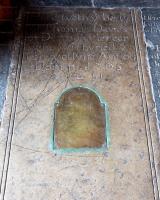
On 12th June 1705 or 15th June 1705 Thomas Davies of Denbigh (age 51) died. He was buried at St Marcella's Church, Denbigh [Map].
Thomas Davies of Denbigh: Around 1654 he was born. Before 12th June 1705 Thomas Davies of Denbigh and
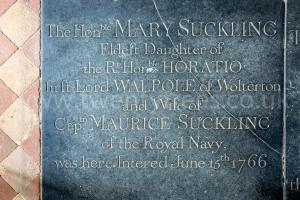
On 15th June 1766 Mary Walpole (age 41) died. She was buried at the Church of St Andrew, Wickmere [Map] on 15th June 1766.
Mary Walpole: On 25th February 1725 she was born to Horatio Walpole 1st Baron Walpole and Mary Magdalen Lombard. On 20th June 1764 Captain Maurice Suckling and she were married. She died twenty months later. There was no issue from the marriage.
All About History Books
The Deeds of King Henry V, or in Latin Henrici Quinti, Angliæ Regis, Gesta, is a first-hand account of the Agincourt Campaign, and subsequent events to his death in 1422. The author of the first part was a Chaplain in King Henry's retinue who was present from King Henry's departure at Southampton in 1415, at the siege of Harfleur, the battle of Agincourt, and the celebrations on King Henry's return to London. The second part, by another writer, relates the events that took place including the negotiations at Troye, Henry's marriage and his death in 1422.
Available at Amazon as eBook or Paperback.

On 15th June 1781 Ann Dighton (age 63) died. Memorial at Lincoln Cathedral [Map].
Ann Dighton: Around 1718 she was born to Reverend Dighton of Newmarket. On 14th June 1762 Reverend John Gordon and she were married.
The London Gazette 15375. Whitehall, June 15, 1801.
The King has been pleased to grant the Dignities of Viscount and Earl of the United Kingdom of Great Britain and Ireland to the Right Honorable William Lord Craven (age 30), and the Heirs Male of his Body lawfully begotten, by the Names, Stiles, and Titles of Viscount Uffington, in the County of Berks, and Earl of Craven in the County of York. [Louisa Brunton Countess Craven (age 16) by marriage Countess Craven in Yorkshire].
The King has been pleased to grant the Dignities of Viscount and Earl of the United Kingdom of Great Britain and Ireland to the Right Honourable George Lord Onslow (age 69), and the Heirs Male of his Body lawfully begotten, by the Names, Stiles, and Title of Viscount Cranley, of Cranley, in the County of Surrey, and Earl of Onslow, of Onslow, in the County of Salop. [Henrietta Shelley Countess Onslow (age 70) by marriage Countess Onslow.]
The King has also been pleased to grant the said Dignities of Viscount and Earl of the United Kingdom of Great Britain and Ireland to the Right Honorable Charles Lord Romney (age 56), and the Heirs Male of his Body lawfully begotten, by the Name, Stiles, and Titles of Viscount Marsham of the Mote, in the County of Kent, and 1st Earl of Romney.
The King has been pleased to grant the Dignity of Earl of the United Kingdom of Great Biitain and Ireland to the Right Honorable Thomas Lord Pelham (age 73), and the Heirs Male of his Body lawfully begotten, by the Name, Stile, and Title of Earl of Chichester. [Anne Frankland Countess Chichester (age 66) by marriage Countess Chichester.]
The King has likewise been pleased to grant the Dignities of Viscount and Earl of the United Kingdom of Great Britain and Ireland, to the Right Honourable Thomas Lord Grey de Wilton (age 51), and the Heirs Male, of his body lawfully begotten, by the Names, Stiles and Titles of Viscount Grey de Wilton, and Earl of Wilton, of Wilton Castle, in the County of Hereford, with Remainders to Thomas Grosvenor, Esq; Second Son, Robert Grosvenor, Esq. Third Son of the Right Honourable Robert Grosvenor (age 34), (commonly called Viscount Belgrave), by Eleanor (age 30) his Wife, Daughter of the said Thomas Lord Grey de Wilton, and the Fourth, Fifth, Sixths Seventh, and every other Son and Sons, of the said Eleanor by her present or any future Husband, hereafter to be begotten severally and successively, and the respective Heirs Male of their Bodies lawfully begotten. [Eleanor Assheton Viscountess Wilton (age 48) by marriage Countess Wilton.]
![]() Become a Member via our 'Buy Me a Coffee' page to read complete text.
Become a Member via our 'Buy Me a Coffee' page to read complete text.
On 15th June 1884 William Bromley-Davenport (age 62) died of a heart attack while seeking to quell disturbances in Lichfield caused by members of his Staffordshire Yeomanry. They were on a training week under his command but indulged in riotous behaviour.
On 15th June 1888 Frederick III King Prussia (age 56) died at New Palace, Potsdam. His son Wilhelm (age 29) succeeded II Emperor aka Kaiser. Hermine Reuss by marriage Empress aka Kaiser.
On 15th June 1905 Gustaf Adolph VI King Sweden (age 22) and Margaret "Daisy" Windsor (age 23) were married. She the daughter of Prince Arthur Windsor 1st Duke Connaught and Strathearn (age 55) and Luise Margarete Hohenzollern Duchess Connaught (age 44). He the son of Gustav V King Sweden (age 46). They were fourth cousin twice removed. He a great x 5 grandson of King George II of Great Britain and Ireland. She a granddaughter of Queen Victoria of the United Kingdom.
On 15th June 1913 Emily Wilding Davison (deceased) was buried at St Mary the Virgin Church Morpeth, Northumberland [Map].
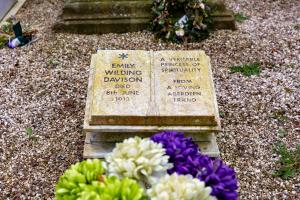
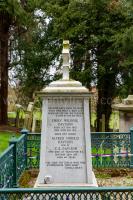

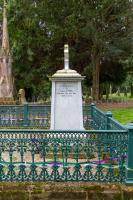
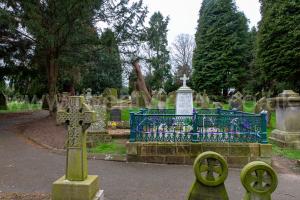
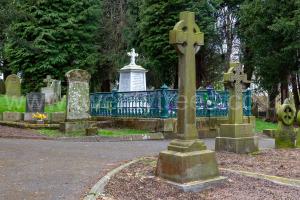
On 15th June 1932 Gerald Wellesley Liddell 6th Baron Ravensworth (age 63) died. He was buried at St Bartholomew's Church, Whittingham [Map]. His son Robert (age 30) succeeded 7th Baron Ravensworth of Ravensworth Castle in County Durham, 12th Baronet Liddell of Ravensworth Castle.
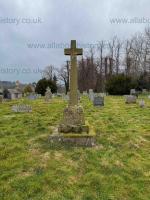
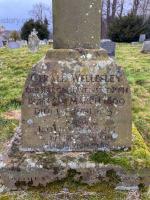
Gerald Wellesley Liddell 6th Baron Ravensworth: On 21st March 1869 he was born to Arthur Thomas Liddell 5th Baron Ravensworth and Sophia Harriett Waller Baroness Ravensworth. On 11th October 1899 Gerald Wellesley Liddell 6th Baron Ravensworth and Isolda Blanche Prideaux-Brune Baroness Ravensworth were married. On 12th November 1919 Arthur Thomas Liddell 5th Baron Ravensworth died. His son Gerald succeeded 6th Baron Ravensworth of Ravensworth Castle in County Durham, 11th Baronet Liddell of Ravensworth Castle. Isolda Blanche Prideaux-Brune Baroness Ravensworth by marriage Baroness Ravensworth of Ravensworth Castle in County Durham.
Robert Arthur Liddell 7th Baron Ravensworth: On 2nd June 1902 he was born to Gerald Wellesley Liddell 6th Baron Ravensworth and Isolda Blanche Prideaux-Brune Baroness Ravensworth. On 4th August 1950 Robert Arthur Liddell 7th Baron Ravensworth died. His first cousin Arthur succeeded 8th Baron Ravensworth of Ravensworth Castle in County Durham, 13th Baronet Liddell of Ravensworth Castle.
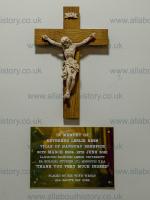
St Werburgh's Church, Hanbury [Map]. Memorial to Reverend Leslie Rees, vicar of Hanbury 30th March 2009 toio 15th June 2021.
Births on the 15th June
On 15th June 1330 Edward "Black Prince" was born to King Edward III of England (age 17) and Philippa of Hainault Queen Consort England (age 15) at Woodstock Palace, Oxfordshire [Map]. Coefficient of inbreeding 3.00%.
On 15th June 1496 Joan Albret was born to Jean III King Navarre (age 27) and Catherine Grailly I Queen Navarre (age 28).
On 15th June 1515 Anne Parr Countess Pembroke was born to Thomas Parr (age 32) and Maud Green (age 23).
On 15th June 1519 Henry Fitzroy 1st Duke Richmond and Somerset was born illegitimately to Henry VIII (age 27) and Elizabeth "Bessie" Blount Baroness Clinton and Tailboys (age 21) at Augustinian Priory of St Lawrence, Ingatestone [Map].
All About History Books
The Chronicle of Abbot Ralph of Coggeshall describes the reigns of Kings Henry II, Richard I, John and Henry III, providing a wealth of information about their lives and the events of the time. Ralph's work is detailed, comprehensive and objective. We have augmented Ralph's text with extracts from other contemporary chroniclers to enrich the reader's experience. Available at Amazon in eBook and Paperback.
On 13th October 1622 Ralph Delaval 1st Baronet was born to Robert Delaval of Seaton Delaval (age 22) and Barbara Selby. He was baptised on 27th October 1622. He was educated at Queen's College, Oxford University; matriculated 15th June 1638. He was admitted to Lincoln's Inn on 28th November 1639.
On 15th June 1636 Thomas Slingsby 2nd Baronet was born to Henry Slingsby 1st Baronet (age 34) and Barbara Belasyse (age 26).
On 15th June 1645 Sidney Godolphin 1st Earl Godolphin was born to Francis Godolphin (age 39) and Dorothy Berkeley (age 43).
On 15th June 1685 Frances Shelley Viscountess Fitzwilliam was born to John Shelley 3rd Baronet (age 23) and Winifred Neville Lady Shelley.
On 15th June 1709 Louis Bourbon Condé Count Clermont was born to Louis Bourbon Condé (age 40) and Louise Françoise Bourbon (age 36). He a great x 3 grandson of King James I of England and Ireland and VI of Scotland.
On 15th June 1713 Mary Scrope Countess of Deloraine was born to Gervase Scrope of Cockeringham (age 30) and Elizabeth Cresswell (age 21).
On 15th June 1724 John Henniker 1st Baron Henniker was born.
On 15th June 1760 Reverend Richard Wolseley 4th Baronet was born to Colonel Clement Wolseley (age 30) and Catherine St George (age 28). Coefficient of inbreeding 6.25%.
All About History Books
The Chronicle of Geoffrey le Baker of Swinbroke. Baker was a secular clerk from Swinbroke, now Swinbrook, an Oxfordshire village two miles east of Burford. His Chronicle describes the events of the period 1303-1356: Gaveston, Bannockburn, Boroughbridge, the murder of King Edward II, the Scottish Wars, Sluys, Crécy, the Black Death, Winchelsea and Poitiers. To quote Herbert Bruce 'it possesses a vigorous and characteristic style, and its value for particular events between 1303 and 1356 has been recognised by its editor and by subsequent writers'. The book provides remarkable detail about the events it describes. Baker's text has been augmented with hundreds of notes, including extracts from other contemporary chronicles, such as the Annales Londonienses, Annales Paulini, Murimuth, Lanercost, Avesbury, Guisborough and Froissart to enrich the reader's understanding. The translation takes as its source the 'Chronicon Galfridi le Baker de Swynebroke' published in 1889, edited by Edward Maunde Thompson. Available at Amazon in eBook and Paperback.
On 15th June 1760 William Feilding was born to Basil Feilding 5th Earl Desmond 6th Earl Denbigh (age 41) and Mary Cotton Countess Desmond and Denbigh (age 7).
On 15th June 1765 Henry Thomas Colebrooke was born to George Colebrooke 2nd Baronet (age 36) and Mary Gaynor.
On 15th June 1790 Admiral Frederick Edward Vernon-Harcourt was born to Archbishop Edward Venables-Vernon-Harcourt (age 32) and Anne Leveson-Gower (age 29).
On 15th June 1812 Harriet Anne Cockerell was born to Charles Cockerell 1st Baronet (age 57) and Harriet Rushout (age 42).
On 15th June 1820 Henry Pitt Cholmondeley was born to Thomas Cholmondeley 1st Baron Delamere (age 52) and Henrietta Elizabeth Williams-Wynn Baroness Delamere at Whitegate, Cheshire.
On 15th June 1823 George Leveson-Gower aka Egerton 2nd Earl Ellesmere was born to Francis Leveson Gower aka Egerton 1st Earl Ellesmere (age 23) and Harriet Greville Countess Ellesmere (age 20).
On 15th June 1832 Louisa Vonalten Duchess Devonshire and Manchester was born to Karl Franz Viktor Vonalten (age 31).
On 15th June 1836 Constance Harriet Mahonesa Talbot Marchioness Lothian was born to Henry John Chetwynd-Talbot 3rd Earl Talbot 18th Earl of Shrewsbury (age 32) and Sarah Elizabeth Beresford Countess Talbot Shrewsbury Waterford (age 28) at Blickling Hall, Norfolk [Map].
On 15th June 1845 Charles George Perceval 7th Earl Egmont was born to Charles George Perceval (age 48) and Frances Agnes Trevelyan.
On 15th June 1856 Cecilia Margaret Harbord Marchioness was born to Charles Harbord 5th Baron Suffield (age 26) and Cecilia Annetta Baring Baroness Suffield (age 22).
All About History Books
The Chronicle of Geoffrey le Baker of Swinbroke. Baker was a secular clerk from Swinbroke, now Swinbrook, an Oxfordshire village two miles east of Burford. His Chronicle describes the events of the period 1303-1356: Gaveston, Bannockburn, Boroughbridge, the murder of King Edward II, the Scottish Wars, Sluys, Crécy, the Black Death, Winchelsea and Poitiers. To quote Herbert Bruce 'it possesses a vigorous and characteristic style, and its value for particular events between 1303 and 1356 has been recognised by its editor and by subsequent writers'. The book provides remarkable detail about the events it describes. Baker's text has been augmented with hundreds of notes, including extracts from other contemporary chronicles, such as the Annales Londonienses, Annales Paulini, Murimuth, Lanercost, Avesbury, Guisborough and Froissart to enrich the reader's understanding. The translation takes as its source the 'Chronicon Galfridi le Baker de Swynebroke' published in 1889, edited by Edward Maunde Thompson. Available at Amazon in eBook and Paperback.
On 15th June 1863 Jane Grey McDonnell Baroness Clinton was born to Mark Kerr aka McDonnell 5th Earl of Antrim (age 49) and Jane Macan Countess of Antrim (age 38).
On 15th June 1887 Major John Clive Darling was born to Charles John Darling 1st Baron Darling (age 37) and Mary Caroline Greathed (age 23).
On 15th June 1889 Betty Constance Manners was born to John Manners-Sutton 3rd Baron Manners (age 37) and Constance Hamlyn-Fane Baroness Manners (age 27).
On 15th June 1902 Francis George North was born to Frederick George North 8th Earl Guildford (age 25).
On 15th June 1913 Alexandra Caroline Paget was born to Charles Henry Alexander Paget 6th Marquess Anglesey (age 28) and Victoria Marjorie Harriet Manners Marchioness Anglesey (age 29).
On 15th June 1943 John Lyttelton 11th Viscount Cobham was born to Charles Lyttelton 10th Viscount Cobham (age 33).
On 15th June 1946 Richard John Rycroft 8th Baronet was born to Henry Richard Rycroft (age 34).
On 15th June 1954 Lyulph Lubbock 5th Baron Avebury was born to Eric Lubbock 4th Baron Avebury (age 25) and Kina-Maria O'Kelly de Gallagh Baroness Avebury.
Marriages on the 15th June
On 15th June 1315 James "The Just" II King Aragon (age 48) and Marie Lusignan Queen Consort Aragon were married. She by marriage Queen Consort Aragon. He the son of Peter III King Aragon and Constance Hohenstaufen Queen Consort Aragon.
On 15th June 1514 Henry Somerset 2nd Earl of Worcester (age 18) and Margaret Courtenay Countess of Worcester (age 15) were married. She by marriage Countess Worcester. She the daughter of William Courtenay 1st Earl Devon and Catherine York Countess Devon (age 34). He the son of Charles Somerset 1st Earl of Worcester (age 54) and Elizabeth Herbert 3rd Baroness Herbert Raglan. They were second cousins. He a great x 4 grandson of King Edward III of England. She a granddaughter of King Edward IV of England.
On 15th June 1560 Johann Wilhelm Wettin Duke Saxe Weimar (age 30) and Dorothea Susanne Palatine Duchess Saxe Weimar were married at Heidelburg. She the daughter of Frederick Palatine III Elector Palatine.
On 15th June 1650 Robert Paston 1st Earl of Yarmouth (age 19) and Rebecca Clayton Countess Yarmouth (age 15) were married.
On 15th June 1651 Ernest Günther Oldenburg I Duke Schleswig Holstein Sonderburg Augustenburg (age 41) and Auguste Oldenburg Duchess Schleswig Holstein Sonderburg Augustenburg (age 17) were married. She by marriage Duchess Schleswig Holstein Sonderburg Augustenburg. The difference in their ages was 23 years. He the son of Alexander Oldenburg I Duke Schleswig Holstein Sonderburg and Dorothea Schwarzburg Duchess Schleswig Holstein Sonderburg. They were first cousins.
On 15th June 1667 Christian V King of Denmark and Norway (age 21) and Charlotte Amalie Hesse-Kassel Queen Consort Denmark and Norway (age 17) were married. She the daughter of Wilhelm "The Just" VI Hesse-Kassel and Hedwig Sophia Hohenzollern (age 43). He the son of Frederick III King of Denmark (age 58) and Sophie Amalie Hanover Queen Consort Denmark (age 39). They were fourth cousins.
On 15th June 1742 George Lyttelton 1st Baron Lyttelton (age 33) and Lucy Fortescue (age 24) were married.
On 15th June 1754 Thomas Pelham 1st Earl Chichester (age 26) and Anne Frankland Countess Chichester (age 19) were married at Mortlake, Richmond.
On 15th June 1775 Charles Philip Stourton 17th Baron Stourton (age 22) and Mary Langdale Baroness Stourton (age 23) were married. She by marriage Baroness Stourton. They were fifth cousins.
All About History Books
The Deeds of King Henry V, or in Latin Henrici Quinti, Angliæ Regis, Gesta, is a first-hand account of the Agincourt Campaign, and subsequent events to his death in 1422. The author of the first part was a Chaplain in King Henry's retinue who was present from King Henry's departure at Southampton in 1415, at the siege of Harfleur, the battle of Agincourt, and the celebrations on King Henry's return to London. The second part, by another writer, relates the events that took place including the negotiations at Troye, Henry's marriage and his death in 1422.
Available at Amazon as eBook or Paperback.
On 15th June 1807 Henry Delves Broughton 8th Baronet (age 30) and Mary Pigott Lady Broughton (age 19) were married. They had nine sons and nine daughters.
On 15th June 1822 John Bathurst Deane (age 24) and Caroline Lemprière were married at St Nicholas's Church, Shaldon [Map].
On 15th June 1822 John Hely-Hutchinson 3rd Earl of Donoughmore (age 35) and Margaret Gardiner (age 26) were married. They had two children.
On 15th June 1826 Mathew Wilson 1st Baronet (age 23) and Sophia Louisa Emerson Amcotts (age 22) were married.
On 15th June 1905 Gustaf Adolph VI King Sweden (age 22) and Margaret "Daisy" Windsor (age 23) were married. She the daughter of Prince Arthur Windsor 1st Duke Connaught and Strathearn (age 55) and Luise Margarete Hohenzollern Duchess Connaught (age 44). He the son of Gustav V King Sweden (age 46). They were fourth cousin twice removed. He a great x 5 grandson of King George II of Great Britain and Ireland. She a granddaughter of Queen Victoria of the United Kingdom.
On 15th June 1920 Hugo Meynell FitzHerbert 6th Baronet (age 47) and Diana Isabel Erskine Lady Fitzherbert (age 28) were married. She by marriage Lady Fitzherbert of Tissington in Derbyshire.
On 15th June 1926 Harold Arthur Lee Dillon 17th Viscount Dillon (age 82) and Margaret Louisa Everard ffolkes Viscountess Dillon were married. She by marriage Viscountess Dillon of Costello Gallen in Mayo.
Deaths on the 15th June
On 15th June 923 Robert I King West Francia (age 57) died. On 13th July 923 his son-in-law Rudolph aka Raoul I King West Francia (age 33) was elected I King West Francia.
On 15th June 1381 King Richard II of England (age 14) met with Wat Tyler at Smithfield [Map]. During the course of the meeting Wat Tyler was wounded by William Walworth. Wat Tyler was then captured and beheaded at Smithfield [Map]. His head was placed on top a pole and carried through the city, then displayed on London Bridge.
On 15th June 1416 John Valois 1st Duke Berry (age 75) died. Duke Berry extinct. His daughter Marie (age 41) succeeded I Duchess Auvergne.
On 15th June 1467 Philip "Good" Valois III Duke Burgundy (age 70) died. His son Charles (age 33) succeeded Duke Burgundy.
All About History Books
The Chronicle of Walter of Guisborough, a canon regular of the Augustinian Guisborough Priory, Yorkshire, formerly known as The Chronicle of Walter of Hemingburgh, describes the period from 1066 to 1346. Before 1274 the Chronicle is based on other works. Thereafter, the Chronicle is original, and a remarkable source for the events of the time. This book provides a translation of the Chronicle from that date. The Latin source for our translation is the 1849 work edited by Hans Claude Hamilton. Hamilton, in his preface, says: "In the present work we behold perhaps one of the finest samples of our early chronicles, both as regards the value of the events recorded, and the correctness with which they are detailed; Nor will the pleasing style of composition be lightly passed over by those capable of seeing reflected from it the tokens of a vigorous and cultivated mind, and a favourable specimen of the learning and taste of the age in which it was framed." Available at Amazon in eBook and Paperback.
On 15th June 1505 Ercole Este I Duke Ferrara (age 73) died. His son Alfonso (age 28) succeeded I Duke Ferrara.
On 15th June 1585 Jacques of Savoy 2nd Duke of Nemours (age 53) died. His son Henri (age 12) succeeded Duke Nemours.
On 15th June 1596 Bishop Richard Fletcher (age 51) died.
On 15th June 1614 Henry Howard 1st Earl of Northampton (age 74) died unmarried. He was buried at Chapel Dover Castle. Earl of Northampton extinct.
On 15th June 1644 Edward Montagu 1st Baron Montagu (age 81) died at the Savoy Hospital. His son Edward (age 27) succeeded 2nd Baron Montagu of Boughton in Northamptonshire.
On 15th June 1707 Antonio Verrio (age 71) died.
On 15th June 1778 Cecil Bisshopp 6th Baronet (age 77) died. His son Cecil succeeded 7th Baronet Bisshopp of Parham in Sussex.
All About History Books
The Chronicle of Walter of Guisborough, a canon regular of the Augustinian Guisborough Priory, Yorkshire, formerly known as The Chronicle of Walter of Hemingburgh, describes the period from 1066 to 1346. Before 1274 the Chronicle is based on other works. Thereafter, the Chronicle is original, and a remarkable source for the events of the time. This book provides a translation of the Chronicle from that date. The Latin source for our translation is the 1849 work edited by Hans Claude Hamilton. Hamilton, in his preface, says: "In the present work we behold perhaps one of the finest samples of our early chronicles, both as regards the value of the events recorded, and the correctness with which they are detailed; Nor will the pleasing style of composition be lightly passed over by those capable of seeing reflected from it the tokens of a vigorous and cultivated mind, and a favourable specimen of the learning and taste of the age in which it was framed." Available at Amazon in eBook and Paperback.
On 15th June 1809 George Baker 1st Baronet (age 87) died. He was buried at St James' Church, Piccadilly. His son Frederick (age 37) succeeded 2nd Baronet Baker of Loventor in Totnes in Devon.
On 15th June 1822 Horatio Walpole 2nd Earl Orford (age 69) died. His son Horatio (age 39) succeeded 3rd Earl Orford, 4th Baron Walpole of Wollerton. Mary Fawkener Countess Orford (age 34) by marriage Countess Orford.
On 15th June 1828 Elizabeth Boscawen Duchess Beaufort (age 81) died.
On 15th June 1835 James Stopford 3rd Earl of Courtown (age 69) died.
On 15th June 1844 Thomas Campbell (age 66) died.
On 15th June 1856 George Duckett 2nd Baronet (age 78) died. His son George (age 45) succeeded 3rd Baronet Jackson aka Duckett of Hartham House in Wiltshire.
On 15th June 1864 Archibald Acheson 3rd Earl Gosford (age 57) died. His son Archibald (age 22) succeeded 4th Earl Gosford.
On 15th June 1866 Bellingham Reginald Graham 7th Baronet (age 76) died. His son Reginald (age 31) succeeded 8th Baronet Graham of Norton Conyers in Yorkshire.
On 15th June 1876 John Ormsby-Gore 1st Baron Harlech (age 60) died. His brother William (age 57) succeeded 2nd Baron Harlech. Emily Charlotte Seymour-Conway Baroness Harlech by marriage Baroness Harlech.
On 15th June 1888 Frederick III King Prussia (age 56) died at New Palace, Potsdam. His son Wilhelm (age 29) succeeded II Emperor aka Kaiser. Hermine Reuss by marriage Empress aka Kaiser.
All About History Books
The Chronicle of Abbot Ralph of Coggeshall describes the reigns of Kings Henry II, Richard I, John and Henry III, providing a wealth of information about their lives and the events of the time. Ralph's work is detailed, comprehensive and objective. We have augmented Ralph's text with extracts from other contemporary chroniclers to enrich the reader's experience. Available at Amazon in eBook and Paperback.
On 15th June 1913 William George Spencer Scott Compton 5th Marquess Northampton (age 62) died in Acqui. His son William (age 27) succeeded 6th Marquess Northampton, 14th Earl of Northampton, 6th Earl Compton of Compton in Warwickshire, 6th Baron Wilmington of Wilmington in Sussex.
On 15th June 1916 Laura Caroline Russell Countess Wilton (age 74) died.
On 15th June 1932 Gerald Wellesley Liddell 6th Baron Ravensworth (age 63) died. He was buried at St Bartholomew's Church, Whittingham [Map]. His son Robert (age 30) succeeded 7th Baron Ravensworth of Ravensworth Castle in County Durham, 12th Baronet Liddell of Ravensworth Castle.


Gerald Wellesley Liddell 6th Baron Ravensworth: On 21st March 1869 he was born to Arthur Thomas Liddell 5th Baron Ravensworth and Sophia Harriett Waller Baroness Ravensworth. On 11th October 1899 Gerald Wellesley Liddell 6th Baron Ravensworth and Isolda Blanche Prideaux-Brune Baroness Ravensworth were married. On 12th November 1919 Arthur Thomas Liddell 5th Baron Ravensworth died. His son Gerald succeeded 6th Baron Ravensworth of Ravensworth Castle in County Durham, 11th Baronet Liddell of Ravensworth Castle. Isolda Blanche Prideaux-Brune Baroness Ravensworth by marriage Baroness Ravensworth of Ravensworth Castle in County Durham.
Robert Arthur Liddell 7th Baron Ravensworth: On 2nd June 1902 he was born to Gerald Wellesley Liddell 6th Baron Ravensworth and Isolda Blanche Prideaux-Brune Baroness Ravensworth. On 4th August 1950 Robert Arthur Liddell 7th Baron Ravensworth died. His first cousin Arthur succeeded 8th Baron Ravensworth of Ravensworth Castle in County Durham, 13th Baronet Liddell of Ravensworth Castle.
On 15th June 1932 Randall McDonnell 7th Earl of Antrim (age 53) died. His son Randal (age 21) succeeded 8th Earl Antrim 2C, 8th Viscount Dunluce.
On 15th June 1935 George Leopold Bryan aka Bellew 4th Baron Bellew (age 78) died without issue. His nephew Edward (age 46) succeeded 5th Baron Bellew of Barmeath in Louth, 11th Baronet Bellew of Barmeath in Louth.
On 15th June 1942 Arthur Crofton 4th Baron Crofton (age 75) died. His grandson Edward (age 16) succeeded 5th Baron Crofton, 6th Baronet Crofton of The Mote in Roscommon.
On 15th June 1954 Hugh Matthew Fiennes Croft 12th Baronet (age 80) died. His son Bernard (age 50) succeeded 13th Baronet Croft of Croft Castle in Herefordshire
On 15th June 1959 Antoinette Fredericka Conyngham Baroness Croft (age 36) died.
All About History Books
The Chronicle of Geoffrey le Baker of Swinbroke. Baker was a secular clerk from Swinbroke, now Swinbrook, an Oxfordshire village two miles east of Burford. His Chronicle describes the events of the period 1303-1356: Gaveston, Bannockburn, Boroughbridge, the murder of King Edward II, the Scottish Wars, Sluys, Crécy, the Black Death, Winchelsea and Poitiers. To quote Herbert Bruce 'it possesses a vigorous and characteristic style, and its value for particular events between 1303 and 1356 has been recognised by its editor and by subsequent writers'. The book provides remarkable detail about the events it describes. Baker's text has been augmented with hundreds of notes, including extracts from other contemporary chronicles, such as the Annales Londonienses, Annales Paulini, Murimuth, Lanercost, Avesbury, Guisborough and Froissart to enrich the reader's understanding. The translation takes as its source the 'Chronicon Galfridi le Baker de Swynebroke' published in 1889, edited by Edward Maunde Thompson. Available at Amazon in eBook and Paperback.
On 15th June 1962 George Charles Montagu 9th Earl Sandwich (age 87) died. His son Victor (age 56) succeeded 10th Earl Sandwich. Anne Cavendish Countess Sandwich (age 52) by marriage Countess Sandwich.
On 15th June 1963 Nigel Amyas Orde-Powlett 6th Baron Bolton (age 63) died. His son Richard (age 33) succeeded 7th Baron Bolton of Bolton in Yorkshire. Christine Helene Weld-Forester Baroness Bolton (age 31) by marriage Baroness Bolton of Bolton in Yorkshire.
On 15th June 1980 Major Peter Stuart Bligh 10th Earl of Darnley (age 64) died. His half brother Adam (age 38) succeeded 11th Earl Darnley, 20th Baron Clifton of Leighton Bromswold in Huntingdonshire.
On 15th June 1982 Hartley Glover Lady Paget (age 88) died.
On 15th June 1989 Richard Byron 12th Baron Byron (age 89) died. His son Robert (age 39) succeeded 13th Baron Byron of Rochdale in Lancashire.
On 15th June 2002 Patrick Graham Astley-Cooper 6th Baronet (age 83) died. His son Alexander (age 59) succeeded 7th Baronet Astley-Cooper of Gadebridge in Hertfordshire.
On 15th June 2010 Ashley Ponsonby 2nd Baronet (age 89) died. His son Charles (age 59) succeeded 3rd Baronet Ponsonby of Wooton in Oxfordshire.